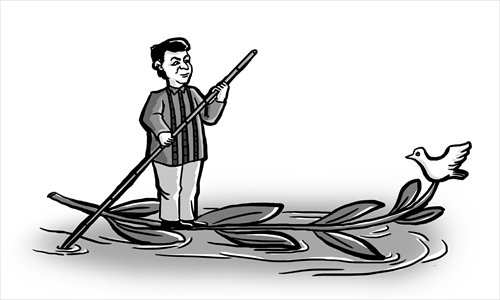Indonesia seeks active role in sea disputes

Indonesia is not a claimant to any part, land or water, of Xisha, Nansha, Zhongsha or to any other portion of what is generally known as the South China Sea. However, it is keenly interested in the South China Sea disputes for two reasons.
One reason is Jakarta's uncertainty over the meaning and location of the nine-dashed, U-shaped line around the South China Sea on Chinese official maps. Specifically, it has been wondering whether China is claiming any jurisdiction that includes the Natuna group of land features and their adjacent waters, which currently produce gas largely for export by Indonesia.
The other reason is broader. Indonesia has always believed that national development, including its own, is possible only if peace and stability prevail in its region, in this case Southeast Asia and its environs.
Thus, in the Indonesian lexicon, "regional resilience" and "national resilience" are often mentioned in the same breath.
Indonesia also believes that the political cohesion of Southeast Asia, as expressed through the Association of Southeast Asian Nations, or ASEAN, is an important key to regional peace and stability.
Since the South China Sea disputes are a potential source of conflict and instability in the region, Indonesia has been playing an active role, as part of its subtle leadership of the association, in getting ASEAN to seek to ensure that the disputes in the South China Sea do not escalate into armed conflict.
In July, the chairman of the ASEAN Ministerial Meeting was held in Cambodia. Hor Namhong of Cambodia, ASEAN's chair for 2012, issued, on behalf of all his ASEAN colleagues, a statement on the South China Sea that was based totally on an Indonesian draft. A negotiated compromise undertaken at the initiative of Indonesia's foreign minister, Marty Natalegawa, the statement placed ASEAN squarely behind the peaceful settlement of disputes, and the early conclusion of a code of conduct for the South China Sea.
This was only the latest expression of Indonesia's interest in the conflicting claims to the South China Sea.
Since 1990, Indonesia has been convening, hosting and otherwise serving as the moving spirit behind the series of annual workshops on "managing potential conflict in the South China Sea." Indonesian experts have also proposed that joint development take place in an area of the South China Sea that is not covered by any exclusive economic zone.
This assumes, of course, that the 1982 UN Convention on the Law of the Sea (UNCLOS), to which China and all of ASEAN are parties, is to govern the maritime jurisdictions of states.
UNCLOS does not pretend to resolve disputes over sovereignty or jurisdiction.
Rather, it lays down the law and rules on maritime jurisdiction. In this regard, some claimants have already aligned their claims closer to the requirements of the 1982 UNCLOS.
In its Law of the Sea, which is to enter into force at the beginning of 2013, Vietnam has given prevalence to the 1982 UNCLOS and other international agreements to which Vietnam may accede in the future over its domestic law.
In its March 2009 baselines law, the Philippines declared a "regime of islands" in accordance with the 1982 UNCLOS for the land features that it claims in the Nansha Islands and the Huangyan Island.
China and Vietnam promptly protested against the reiteration in the legislation of Philippine claims in the South China Sea.
Together with the Philippines, Fiji, Papua New Guinea and the Bahamas, Indonesia was a leading proponent of the archipelagic doctrine during the conferences that produced the 1982 UNCLOS.
The doctrine, which holds that an archipelagic state, land and water, is a single unit subject to certain conditions, largely found its way to the provisions of the convention.
None of the land groups found in the South China Sea, however, qualifies as an archipelago.
Indonesia is not formally a claimant in the South China Sea. However, it has a deep interest in what happens there and in the relations between ASEAN and China. Those relations are generally excellent and are marred only by the South China Sea disputes.
Jakarta has an enormous stake, and not just in the question of sovereignty over the Natunas.
Like many other countries, claimant or non-claimant, Indonesia has an interest and a stake also in the larger questions of war and peace and of freedom of navigation and overflight in the South China Sea.
Thus China, which is a claimant to land features and waters in the South China Sea and, like Indonesia, a party to the 1982 UNCLOS, is right to consult Jakarta on matters pertaining to the disputes in that body of water.
The author is head of the ASEAN Studies Centre, Institute of Southeast Asian Studies, Singapore. opinion@globaltimes.com.cn